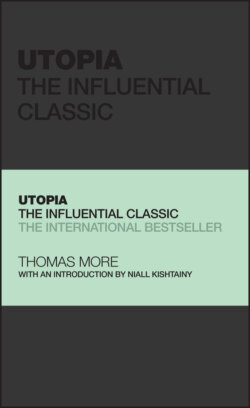Читать книгу Utopia - Sir Thomas More, Thomas More, William Roper - Страница 13
MORE'S INTENTION IN UTOPIA
ОглавлениеThe subtitle of More's opus – A Truly Golden Little Book, No Less Beneficial than Entertaining – raises the central critical problem of Utopia that its readers have been arguing about ever since: what did More intend? Is the book meant as a piece of literary entertainment or as social instruction? If we are meant to take its social arguments seriously, then which of the opposing characters' views are we meant to believe? Is the real More instructing us about how to take our own societies closer to perfection, or is he saying that this is a futile endeavour? Who speaks for the real More: the fictional More and Giles, the sceptics, or Raphael, the arch‐radical?
This sense of ambiguity runs through the text, which is full of word play and paradox, starting with the word utopia itself. It is a Greek‐derived neologism of More's that could mean ‘good place’ (eu‐topia) or ‘no place’ (ou‐topia). The river that flows through Amaurot is called Anyder or ‘waterless’ and the governor of Utopia is named Ademus, ‘without a people’. Even the shape and dimensions of the island described by Raphael turn out to be mathematically impossible. Raphael Hythloday bears as his first name that of the archangel who came to heal, yet the second part of his name means ‘peddler of nonsense’. Finally, More was fond of punning the Latin version of his name, Morus, the Greek for ‘fool’. It raises the question: if Raphael peddles nonsense, then why does the fictional More oppose him with the objections of a halfwit?
This slipperiness is reinforced by the story's basis in real events and people as well as the inclusion in the text of a map, alphabet, and prefatory letters. In one of these letters, More apologizes to Giles for taking so long to finish the book. He admits that he was at first worried about the challenge of arranging the material and expressing it elegantly, but then realized that all he really had to do was to ‘write plainly the matter as I heard it spoken’. He tells Giles that now he has got to the end of the writing he finds that a few details have slipped his mind, such as the width of the bridge spanning the Anyder. Was it five hundred or three hundred yards long? Would Giles mind getting in touch with Raphael and asking him to settle the matter – and while he is at it, clear up a crucial point which More is embarrassed not to have clarified at the time, that is, where in the New World is Utopia actually located? In another letter, Giles says that during their conversations, Raphael did mention the location of the island but, as he did so, someone nearby coughed loudly, drowning out the crucial words. Giles promises to find Raphael and ask him, though there are rumours that he died on his way home or that he returned to Utopia.
This sense of literary play remains even in that part of the text in which Raphael drily catalogues the customs of the Utopians, even without interjections from More and Giles. Some of these seem designed to puzzle and confound. There are slaves in Utopia (people are not born slaves but are made into them as punishment) and the death penalty is used for certain offences. Utopia is a society of strict control and surveillance: the Utopians can only travel with official permission and discussions about public policy outside the senate are punishable by death. The Utopians foment plots in enemy nations and hire assassins to kill enemy leaders.
Here it must be remembered that More wrote before the advent of modern liberalism and individualism, and so to us some of the Utopians' practices look highly objectionable. But they would have looked much less so to a person of the early sixteenth century. What are we to make, though, of the Utopian practice of displaying potential marriage partners naked so that they can inspect each other before deciding to marry – just as one examines a horse before buying it? One modern critic quipped: ‘So this is Utopia is it? I beg your pardon; I thought it was hell.’
